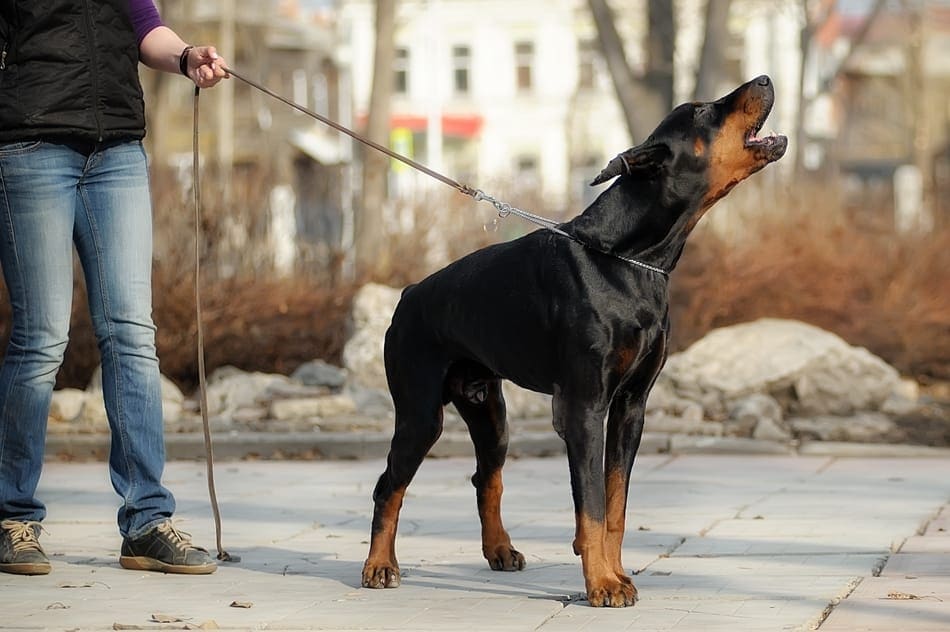When it comes to barking, Doberman Pinschers are known for their vocal prowess. These intelligent and alert dogs have a strong propensity to bark, and it’s no surprise considering their breed history and protective instincts. Did you know that Dobermans were originally bred to be guard dogs? This history explains their natural inclination to bark as a means of alerting their owners to potential threats or intruders.
Along with their protective nature, there are other reasons why Doberman Pinschers may bark frequently. They have a keen sense of hearing and are highly perceptive, which can make them more sensitive to sounds and stimuli in their environment. Additionally, if Dobermans are not properly trained, socialized, or mentally stimulated, they may resort to excessive barking as a way to release pent-up energy or frustration. Providing them with appropriate outlets for their energy and ensuring they receive sufficient exercise and mental stimulation can help address this issue.
Doberman Pinschers are known for their loyalty and protective nature, and they may bark to alert their owners of potential threats. While they are not excessive barkers, they do have a strong guarding instinct, which means they may bark more than some other breeds. Training and socialization can help manage their barking tendencies and teach them appropriate behavior. It’s important to provide mental stimulation, exercise, and a secure environment to keep them happy and prevent excessive barking.

Do Doberman Pinschers Bark a Lot?
Doberman Pinschers are known for their loyalty, intelligence, and protective nature. If you’re considering getting a Doberman as a pet, you may be wondering: do Doberman Pinschers bark a lot? In this article, we’ll explore the barking tendencies of Dobermans, the factors that influence their barking behavior, and how to manage excessive barking if it becomes a concern.
Factors That Influence Doberman Pinschers’ Barking Behavior
Several factors can influence a Doberman Pinscher’s barking behavior. Here are a few key factors to consider:
- Breed Tendency: Doberman Pinschers are natural guard dogs, and barking is one of the ways they express their protectiveness. They are alert and attentive by nature, which means they may be more prone to barking at perceived threats.
- Training and Socialization: Proper training and socialization from an early age play a significant role in shaping a Doberman’s behavior, including their barking tendencies. A well-trained and socialized Doberman is more likely to bark when necessary and remain calm in non-threatening situations.
- Environment: The environment in which a Doberman lives can also influence their barking behavior. If they are exposed to frequent loud noises, excessive barking from neighbors’ dogs, or an inconsistent routine, they may become more prone to barking excessively.
- Anxiety or Fear: Like any dog breed, Doberman Pinschers can experience anxiety or fear, which may result in excessive barking. It’s important to address the underlying cause of their anxiety or fear to help reduce their barking.
Managing Excessive Barking in Doberman Pinschers
If your Doberman Pinscher’s barking becomes excessive or starts causing issues, there are several strategies you can implement to manage it:
- Training and Socialization: Consistent training and socialization are crucial to helping your Doberman understand when it’s appropriate to bark and when to remain quiet. Professional obedience training or enlisting the help of a certified dog trainer can be beneficial.
- Provide Mental Stimulation: Boredom can contribute to excessive barking in Doberman Pinschers. Ensuring they have plenty of mental stimulation through puzzles, toys, and activities can help distract them from barking unnecessarily.
- Use Positive Reinforcement: Reward your Doberman for remaining calm and not barking in situations that would typically trigger barking. Positive reinforcement, such as treats or praise, can reinforce the desired behavior.
- Identify Triggers: Pay attention to the situations or stimuli that trigger excessive barking in your Doberman. It could be certain sounds, people, or even other animals. Once you’ve identified the triggers, work on desensitization and counterconditioning techniques to help them become less reactive.
Remember, it’s essential to be patient and consistent when addressing excessive barking in Doberman Pinschers. Seek guidance from a professional if needed to ensure you’re using the most effective methods for managing their barking behavior.
Benefits of a Doberman Pinscher’s Protective Nature
While excessive barking can be a concern, it’s important to recognize that a Doberman’s protective nature can also be beneficial. Here are a few advantages of owning a Doberman Pinscher with a controlled and balanced barking behavior:
- Security: Doberman Pinschers are excellent guard dogs and can provide a sense of security for you and your family.
- Alertness: Their alertness and tendency to bark when they sense danger can alert you to potential threats or intruders.
- Loyalty: Dobermans are fiercely loyal to their family, and their protective nature is an expression of that loyalty.
Conclusion
In conclusion, while Doberman Pinschers can be prone to barking due to their protective nature and alertness, excessive barking can be managed through proper training, socialization, and providing mental stimulation. Understanding the factors that influence their barking behavior and addressing any underlying anxiety or fear can also help reduce excessive barking. When appropriately managed, a Doberman’s protective nature can provide security and loyalty, making them a wonderful companion for the right owner.
Key Takeaways: Do Doberman Pinschers Bark a Lot?
While Doberman Pinschers are known for being protective, they don’t necessarily bark excessively.
Dobermans may bark to alert their owners of potential danger or strangers approaching, but they can be trained to control their barking.
Proper socialization and training from an early age can help reduce excessive barking in Doberman Pinschers.
Dobermans require regular exercise and mental stimulation, which can help prevent excessive barking caused by boredom.
It’s important to understand that every Doberman Pinscher is unique, and their barking behavior can vary from dog to dog.
Frequently Asked Questions
Doberman Pinschers are known for their loyalty, intelligence, and protective nature. As a breed, they have a reputation for being vocal, but do they really bark a lot? In this section, we will address some common questions related to the barking habits of Doberman Pinschers.
1. Are Doberman Pinschers prone to excessive barking?
While Doberman Pinschers have a natural instinct to alert their owners, they are not considered to be prone to excessive barking. Like any dog, the amount of barking can vary depending on the individual dog’s temperament, training, and environment. With proper socialization and training, Doberman Pinschers can be taught appropriate barking behavior and be less prone to excessive barking.
It’s important to remember that dogs communicate through barking, and it is a normal part of their behavior. However, excessive barking can be a behavior issue that needs to be addressed through training and behavioral modification techniques.
2. Do Doberman Pinschers bark more than other breeds?
It is difficult to make generalizations about the barking tendencies of an entire breed, as individual dogs can vary greatly in their behavior. While Doberman Pinschers have a reputation for being vocal, there are many other breeds that are known to bark more frequently. Factors such as training, socialization, and the specific personality of the dog can all influence how much a Doberman Pinscher barks compared to other breeds.
If you are considering getting a Doberman Pinscher and are concerned about excessive barking, it is important to meet and spend time with the specific dog you are interested in, as their behavior will be a better indication of their barking tendencies than general breed stereotypes.
3. What are some reasons why Doberman Pinschers might bark?
Doberman Pinschers, like any dog, may bark for a variety of reasons. Here are a few common reasons why they might bark:
1. Alerting: Doberman Pinschers have a natural instinct to alert their owners to potential threats or unfamiliar situations. They might bark to let you know that someone is approaching your home or when they sense something unusual.
2. Anxiety or Fear: Doberman Pinschers can become anxious or fearful in certain situations, leading to excessive barking as a result of their stress. This can happen if they are left alone for long periods or if they experience unfamiliar or stressful environments.
3. Boredom or Lack of Mental Stimulation: Doberman Pinschers are intelligent dogs that require mental stimulation. If they are not given enough mental exercise, they may become bored and resort to barking as a way to release their energy and alleviate boredom.
4. Lack of Training or Socialization: Proper training and socialization are crucial for any dog breed, including Doberman Pinschers. Without proper guidance, they may develop behavioral issues, including excessive barking.
4. How can I reduce excessive barking in my Doberman Pinscher?
If your Doberman Pinscher is exhibiting excessive barking, here are some strategies to help reduce this behavior:
1. Training: Enroll your Doberman Pinscher in obedience training classes to teach them appropriate barking behavior and commands to control their vocalization. Positive reinforcement techniques can be effective in modifying their behavior.
2. Socialization: Expose your Doberman Pinscher to various people, dogs, and environments from an early age to help them develop confidence and reduce anxiety that may trigger excess barking.
3. Provide Mental Stimulation: Engage your Doberman Pinscher in activities that stimulate their mind, such as puzzle toys or obedience exercises. A mentally stimulated dog is less likely to engage in excessive barking out of boredom.
4. Address Underlying Issues: If your Doberman Pinscher’s excessive barking is caused by anxiety, fear, or other underlying issues, consult with a professional dog trainer or behaviorist to develop a customized plan to address these specific concerns.
5. Can Doberman Pinschers be trained not to bark?
While it is unrealistic to expect a dog, including a Doberman Pinscher, to never bark, they can be trained to bark less and to stop barking on command. The key is consistent, positive reinforcement training to teach the dog when it is appropriate to bark and when to be quiet.
Keep in mind that barking is a natural behavior for dogs, and completely eliminating it would not be fair or reasonable. Instead, focus on teaching your Doberman Pinscher appropriate barking behavior and providing them with outlets for mental and physical stimulation to minimize excessive barking.

Do Doberman Pinschers bark a lot?
In general, Doberman Pinschers are known to be a breed that vocalizes and barks when necessary.
However, with proper training, socialization, and exercise, their barking can be controlled and reduced to a manageable level.
